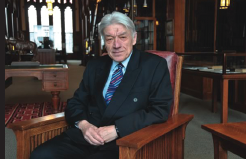
One of Europe’s most productive and well-known translator of Chinese poetry with over 100 books to his name, Kubin is a household name in Chinese literary circles for his public views and scholarly contributions to contemporary Chinese literature. The archive includes several thousand important documents (letters, drafts, news clippings, and other historical documents).
Wolfgang Kubin (顾彬, born December 17, 1945, in Celle, Germany) is one of the most well-known sinologists and prolific translator in Europe. He has published over 100 books of translation, as well scholarship, criticism, and poetry. Over the span of his impressive career, Kubin has become the most widely known and discussed Western literary critic in China. He has never been afraid to voice his opinions, and his views have sparked debates throughout Chinese literary circles for well over a decade. Beyond the dust-ups garnered by his considerable media profile, he has steadily built the most extensive collection of materials chronicling the lives of Chinese poets as they have traveled, and in some cases, immigrated to Europe from the 1980s to present. As the most prolific translator of Chinese poetry into German (of any period), Kubin’s personal network of friendships has spanned a wide range of Chinese writers from the Nobel Prize-winning writer Gao Xingjian, to the most well-known poets of our era (Bei Dao, Gu Cheng, Wang Jiaxin, Yang Lian, etc), and he has attentively collected materials detailing their lives abroad. Kubin’s papers include a singular collection of personal correspondence, original, unpublished poems and calligraphy, and a comprehensive collection of materials that paint a picture of the life-world of Chinese poetry in Europe. The materials now housed at OU include some of the last poems and calligraphy penned by the Chinese poet Gu Cheng before his untimely death in 1993, as well as many other texts and artifacts that are priceless in the eyes of scholars and lovers of Chinese poetry the world over.